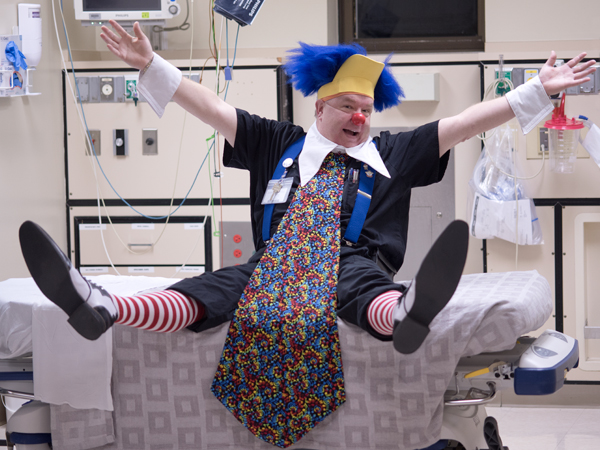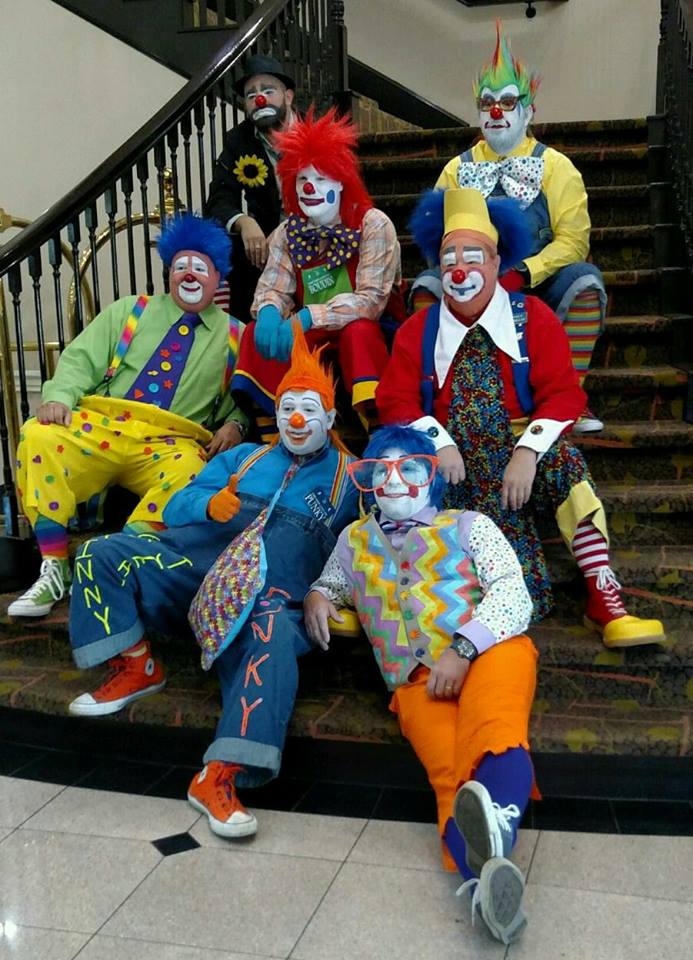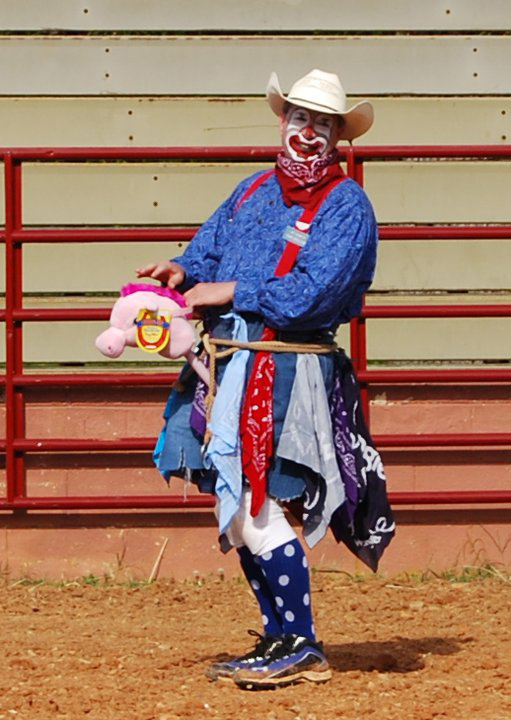People of the U: Chip Thomason

It's been more than three decades, but Chip Thomason remembers vividly the day in 1981 when the clowns saved him from 1,600 pounds of mayhem.
The Marine Corps veteran was bull-riding at a rodeo when the beast threw him before he could clear the chute. “The clowns got me out,” he said of the event's trademark rodeo clowns, who not only entertain, but distract angry bulls from fallen riders by giving them a new target.
Thomason, on his Marine unit's bull-riding team at the time, was left with a combination of broken arms and legs, but also with a new avocation: Becoming a clown by using his talents in tribute to the men who risked their lives to keep him from dying.
A graduate of the Ringling Brothers and Barnum and Bailey Clown College in Venice, Fla., Thomason finds time to serve as director of adult perioperative services at the University of Mississippi Medical Center when he's not clowning around. “I still do rodeos quite frequently, and I'm a Shriner. I do parades, and I go to hospitals a lot,” said Thomason, who has bachelor's and master's degrees in nursing and expects to complete his doctorate next summer.

“I clown religiously, usually every weekend,” he said. The Jackson resident will suit up next for a rodeo Jan. 29-30 in Johnson City, Tenn.
Thomason, 52, has an infectious laugh that doesn't lend itself to the dour face of “sad” clowns. “You have to have the right personality, but not necessarily a sense of humor,” Thomason said of clowning. “It depends on what kind of clown you are.
“Some clowns don't talk. Some clowns are magicians, or do tricks. And in the rodeo, you have the barrel men,” he said of clowns who pop out of barrels in the arena to entertain crowds, but also to distract bulls intent on harming riders.
“It takes the desire to do it, and you have to know in your heart why you want to do it,” Thomason said. “You have to foster that - to feed the flower.”
Travel back to Thomason's accident while stationed in Twentynine Palms, Calif. He vowed to begin his journey to clowndom “once I learned to walk again.” Thomason was transferred to Marine Corps Base Camp Lejeune in Jacksonville, N.C.
In town, he met a former Marine who ran a party shop. “We hit it off, and he taught me a lot about clowning. He was my sponsor to get into Ringling.”
Thomason completed Clown College in four weeks, finishing the usual 10-week program on a fast track because of military responsibilities. “Once you graduate, you go either to their red team or their blue team, but I was active military. I couldn't do that,” he said.
But he could still be a clown, and a student to boot. He found his way home, graduating with a nursing degree in 2001 from King College in Bristol, Tenn., and then got his master's. “I'm a hillbilly boy from up in East Tennessee, so I grew up in overalls and no shoes, for real,” Thomason said.

His heart is not just in the rodeo arena, but in the operating room, where he's spent the last 26 years. “OR nurses are creatures in their own and unlike any other nurse in the hospital,” he said.
Thomason's days in perioperative services are just as busy, if not busier, than a bustling parade brimming with clowns.
“Perioperative services is all-encompassing,” said Thomason, who coordinates the hospital's ORs. “It's for anyone who needs surgery of any sort, from the time they come to the hospital, to being in the surgery holding area, to surgery, then to post-anesthesia coverage.”
His department is a key player in the development of the Medical Center's nursing program. “I'd like to see our hospital and perioperative services be a catalyst for training and upgrading nurses to the national level,” Thomason said. “I want anyone who wants to be an OR nurse to come to our hospital and train.”
This weekend, Thomason will probably trade his scrubs for clown clothes. “I have two steamer trunks full of costumes. What I wear depends on what type clown I'm doing, usually a character clown or a rodeo clown. I can get ready in half an hour.”
Whatever the clown, the name is the same: “Two Dollar. He's crazier than a bedbug,” Thomason said.
Two Dollar?
“I've been collecting $2 bills since I was 5 years old,” Thomason explained. “I have some of the original silver certificates. Some of them are really rare. I have thousands, and I find them all the time. They're worth at least $2.
“My little sister works in the banking industry, and that's what she gives me for Christmas. Of course, she expects me to pay her back.”
Clowning aside, “my goal before retirement is to develop a perioperative nursing program at the baccalaureate level,” Thomason said.
“With that degree, you could go straight into an OR and know what you're doing.”


